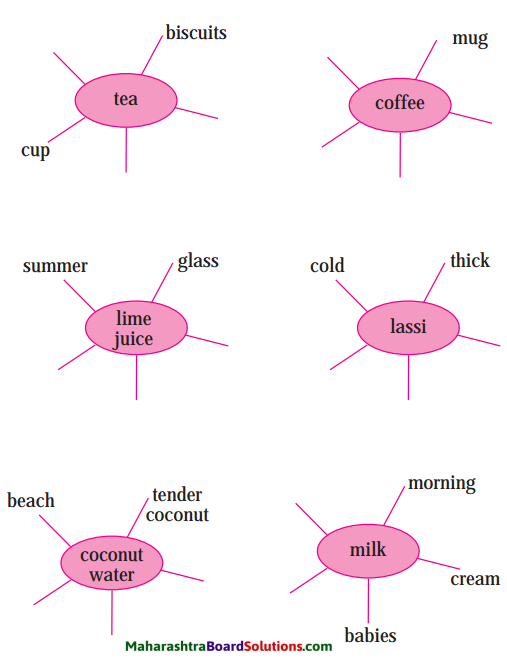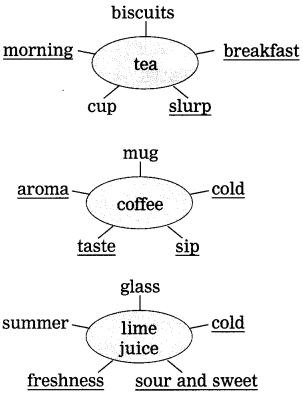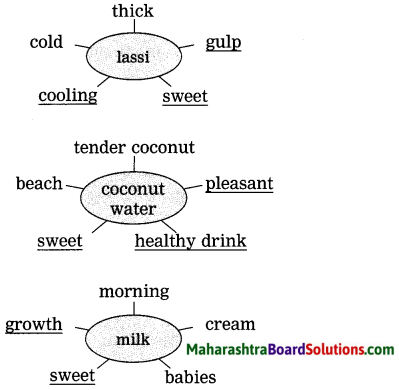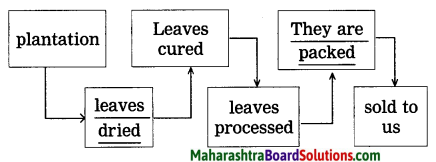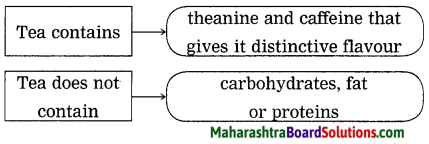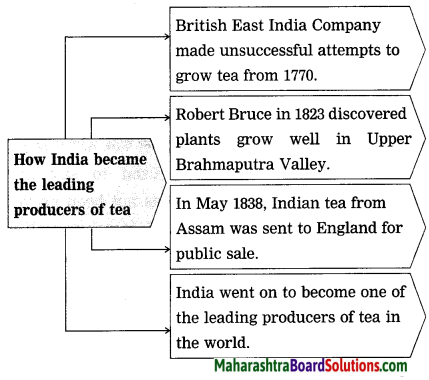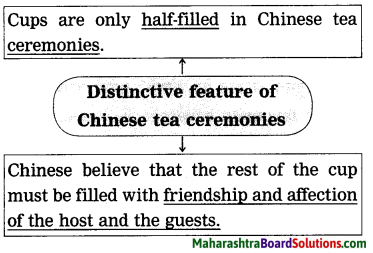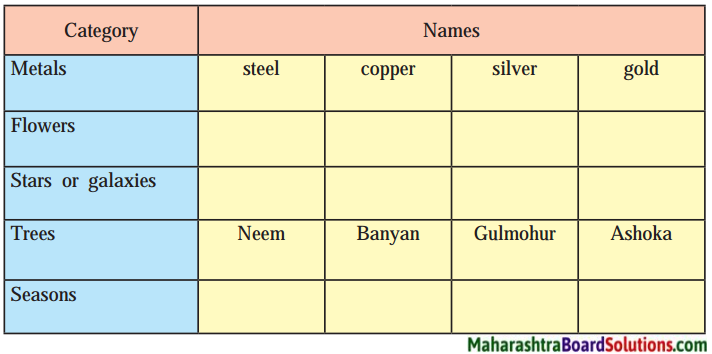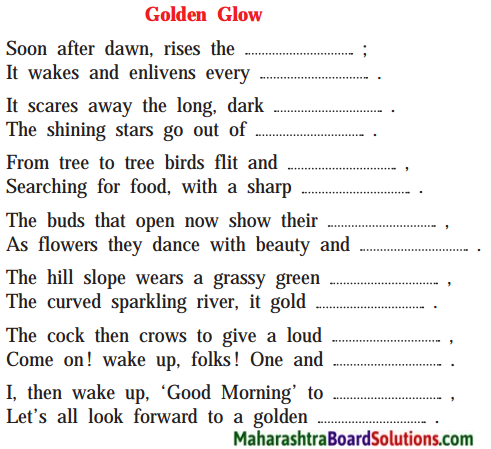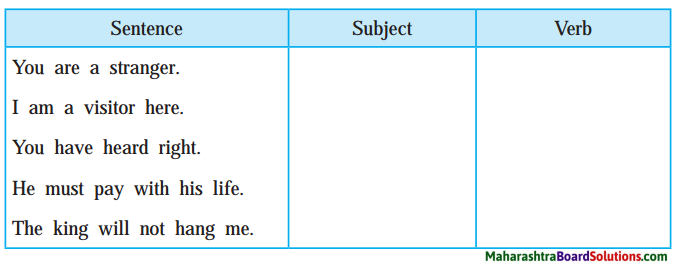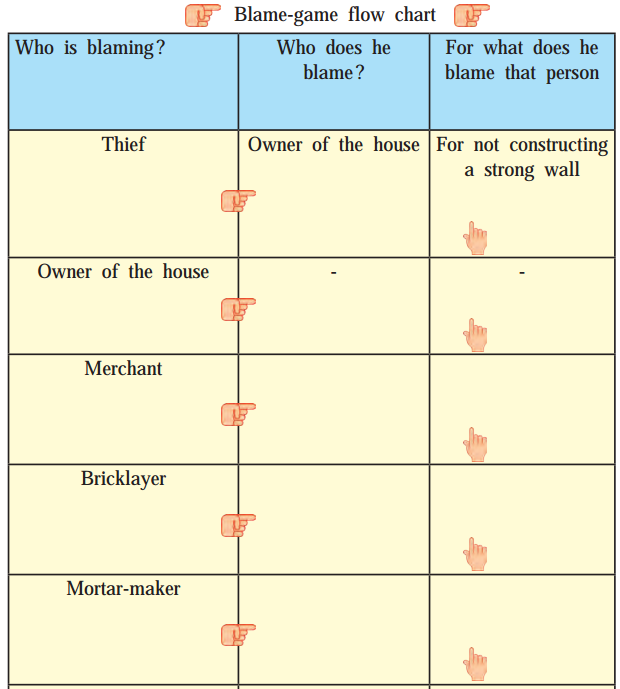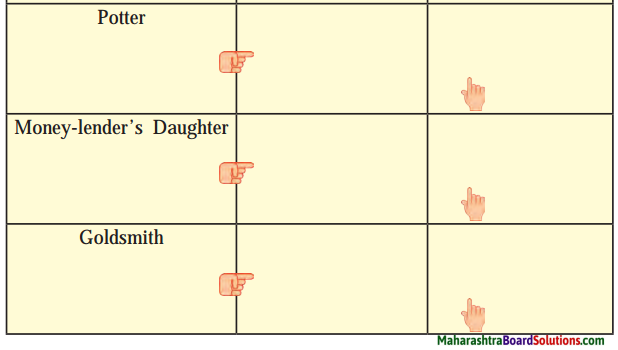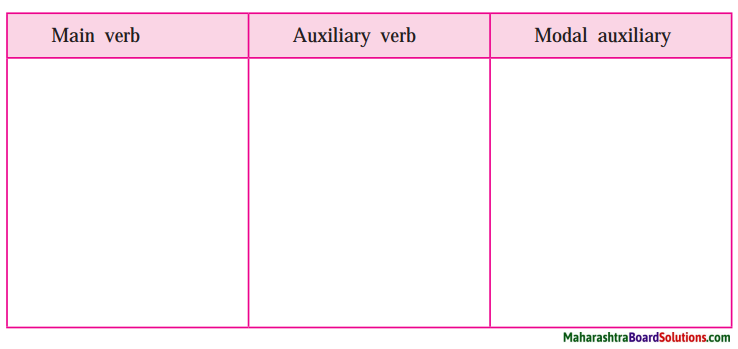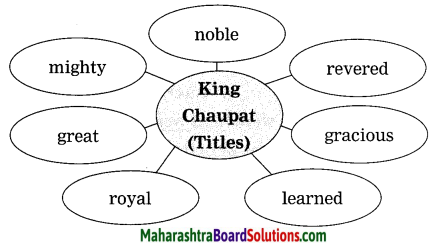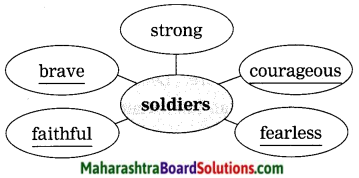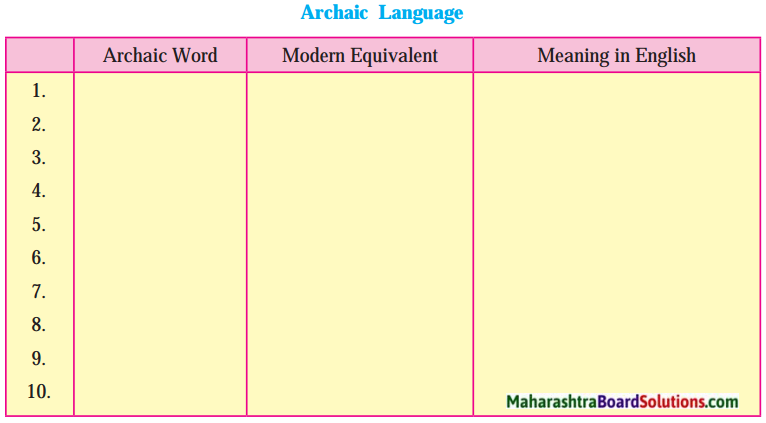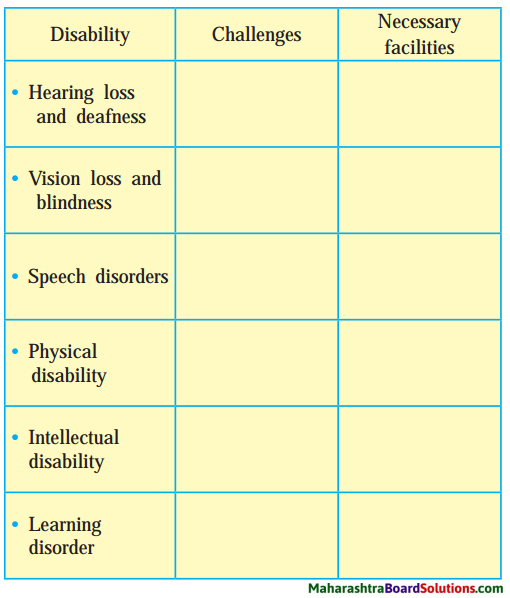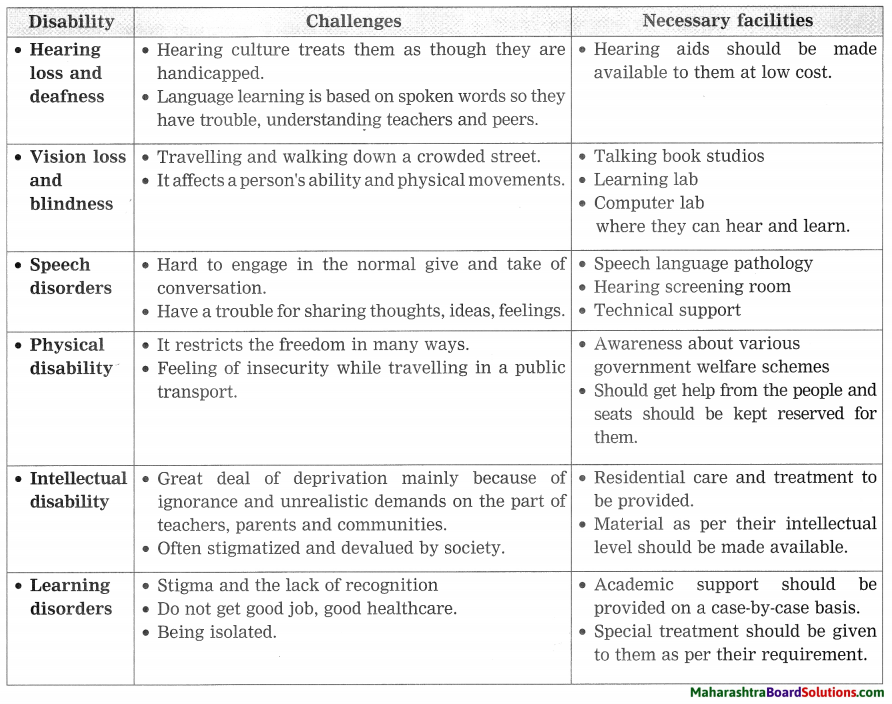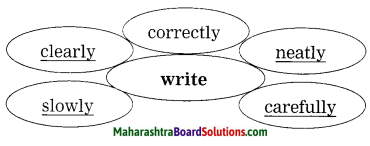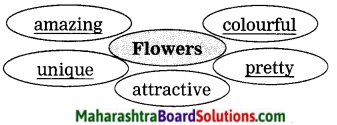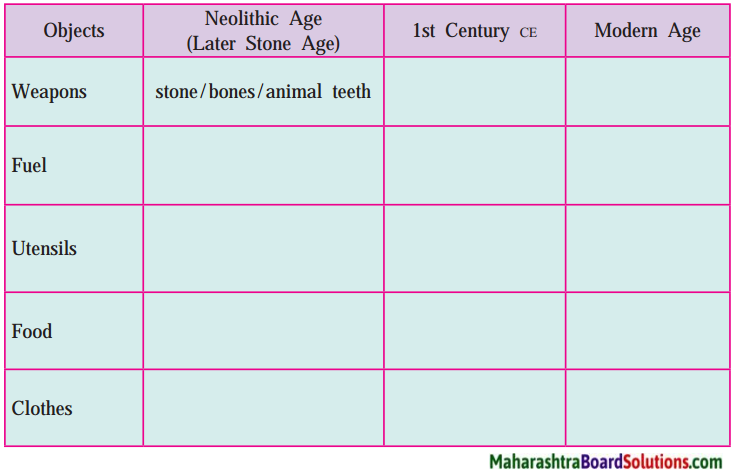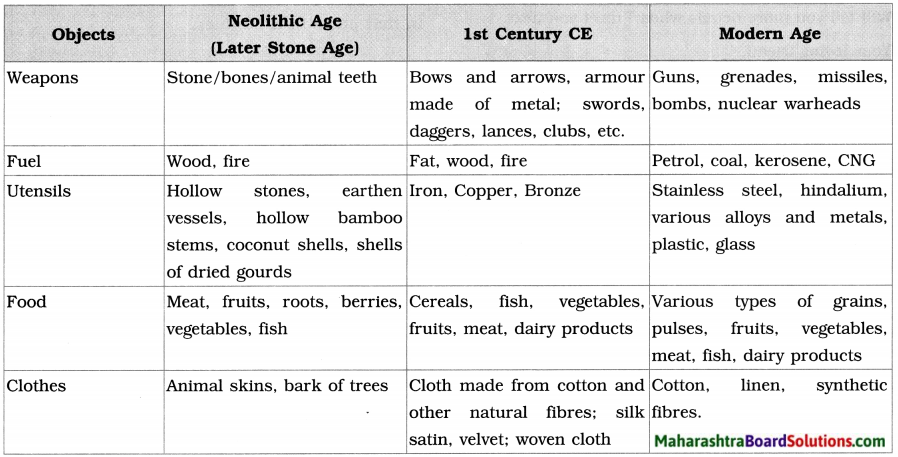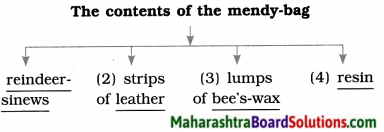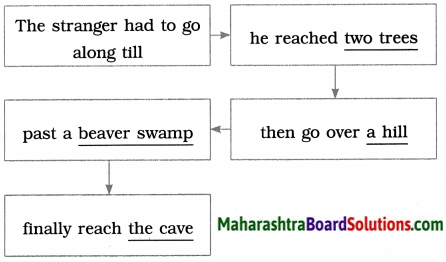Class 9 English Chapter 3.5 Question Answer Maharashtra Board
Balbharti Maharashtra State Board Class 9 English Solutions My English Coursebook Chapter 3.5 Great Scientists Notes, Textbook Exercise Important Questions and Answers.
Great Scientists Poem 9th Std Question Answer
My English Coursebook Std 9 Guide Chapter 3.5 Great Scientists Textbook Questions and Answers
Warming up:
Chit-chat
- What would you like to learn about in your Science period?
- Have you ever tried to do an experiment on your own?
If yes, tell me about it.
If no, tell me why you’ve never tried. - What would you like to learn about in your English classes?
![]()
Inventions
Question (a)
Think of as many examples of the following as you can and write them in the appropriate column:
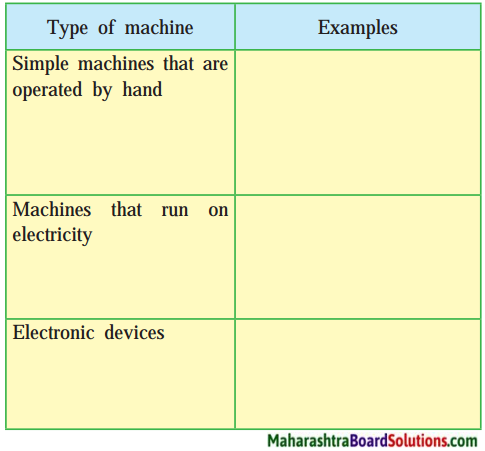
Answer:
| Type of machine | Examples |
| Simple machines that are operated by hand | Screwdriver, pincers, auger chisel, drill machine, spanner, etc. |
| Machines that run on electricity | electric motor, fan, air conditioner, hair drier, geyser, mixer, oven, etc. |
| Electronic devices | Mobile phones, tablets, laptops, computer, speakers, etc. |
Question (b)
Write as many uses of the following as you can:
(a) A cloth bag
(b) a wicker basket
(c) a glass bottle or jar
(d) a steel bowl
(e) a thick string or rope
Answer:
(a) a cloth bag: to carry things, for keeping clothes, shopping, using instead of paper bags, etc.
(b) a wicker basket: for keeping fruits, grains, carrying and selling vegetables, fruits, fish, etc.
(c) a glass bottle or jar: for keeping jam, liquids, juice, pickles, water for drinking, for medicine, kerosene, storing liquids, etc.
(d) a steel bowl: to keep eatables while eating, for drinking medicine, while serving curry, dal, shrikhand, aamras, etc.
(e) a thick string or rope: to tie things, to play, to hold things together, used in adventure sports like trekking, mountaineering, etc., to tether cattle.
English Workshop:
1. Write what is implied in the following sentence:
Question (a)
But few know his inspirational life story, which is all about courage and fighting against the odds. (What does it tell you about Faraday’s life?)
Answer:
Faraday was born in a poverty-stricken family, suffered from a speech defect as a child, had to start working at the age of thirteen. Poor Faraday had to struggle hard against all odds because he had no social status, no money and no education. Even then he toiled hard and achieved a great success after all his difficulties.
Question (b)
Even then Davy did not have much hope for Faraday: (Choose the correct question tag.)
- didn’t he?
- have he?
- does he?
- did he?
Answer:
Even then Davy did not have much hope for Faraday, did he?
![]()
Question (c)
People started telling Davy that of all his discoveries, the best was Faraday himself. (What does it suggest about Davy’s work?)
2. Break the passage into convenient smaller sections. Give sub-headings or titles to each section:
Question 1.
Break the passage into convenient smaller sections. Give sub-headings or titles to each section:
Answer:
1. Passage: Michael Faraday is regarded as ………….. produce the first consistent light bulb.
Title: Faraday’s childhood and his work as a bookbinder.
2. Passage: That day in 1812 Faraday ………………. to see some Davy’s leading experiments.
Title: Faraday’s association with Davy.
3. Passage: Even then Davy did not have much ……………….. born out of mockery directed at Faraday.
Title: Faraday discovered the ‘induction motor’
4. Passage: Faraday became a celebrity scientist ………………. inspire him during difficult times.
Title: Davy’s jealousy and Faraday’s failure!
5. Passage: In 1829, Davy died and Faraday concept called polarization.
Title: 1. Faraday becomes head of Davy’s laboratory.
2. Finds concept of polarization.
6. Passage: He then took the age-old experiment ………………. ‘It does not matter who you are’.
Title:
1. Fortune favours Faraday!
2. Association with Maxwell and Maxwell’s equations creates revolution!
3. List the different gadgets and instruments mentioned in the passage. Find more information about at least 3 of them, using the internet:
Question 1.
List the different gadgets and instruments mentioned in the passage. Find more information about at least 3 of them, using the internet:
Answer:
Gadgets and instruments from the lesson:
fans, air conditioning, sewing machines, photographs, power tools, cars, telescopes, microscopes, electrical generators, dynamos, Electronics and communication system, etc.
![]()
4. Find out more about the following scientists with the help of the Internet.
Question 1.
Find out more about the following scientists with the help of the Internet.
- Michael Faraday
- Humphry Davy
- Thomas Edison
- James Maxwell:
(Students do this on their own using the Internet.)
Language Study:
5. Find the following matter in the passage and copy the missing words:
Question 1.
Find the following matter in the passage and copy the missing words:
(Answers are directly underlined.)
(a) When he was twelve, …………………………… school ………………….
(b) One day he came across a book on ………………………….. .
(c) Faraday decided that ………………… scientist
(d) Davy never believed ……………………. science …………………….
(e) People started telling Davy that ……………………. discoveries, ……………………….
(f) He handed him a piece of Bavarian glass, which ……………………. microscopes, ………………….
(g) He went on to prove that …………………… filings;
(h) It was Maxwell who …………………… equations ………………….
Answer:
(a) When he was twelve, his mother was forced to take him out of school.
(b) One day he came across a book on electricity which had been sent to his master for binding.
(c) Faraday decided that day that he wanted to be a great scientist.
(d) Davy never believed Faraday could do anything in the field of science.
(e) People started telling Davy that of all his discoveries, the best was Faraday himself, this made him even more jealous.
(f) He handed him a piece of Bavarian glass, which was used in the lenses in telescopes and microscopes, and asked him to reverse engineer it.
(g) He went on to prove that these patterns were not a property of the iron filings.
(h) It was Maxwell who translated Faraday’s idea into a set of equations that are now called Maxwell’s equations.
![]()
6. Now Complete the following sentences using your own words/phrases:
Question 1.
Now Complete the following sentences using your own words/phrases:
(Answers are directly given.)
(a) When he was twelve, ………………………. .
(b) One day he came across a book on ………………… .
(c) He decided that …………………. .
(d) He never believed ……………… .
(e) People started telling that ………………. .
(f) He handed him which ……………………. .
(g) He went on to prove that ………………… .
(h) It was ……………….. who ………………… .
Answer:
(a) When he was twelve, he took lessons in martial arts.
(b) One day he came across a book on ‘How to make friends’.
My English Coursebook 9th Class Solutions Chapter 3.5 Great Scientists Additional Important Questions and Answers
Simple Factual Activities:
Question 1.
State if the following statements are True or False : (Answers are directly given.)
Answer:
- Faraday’s work on electricity is still a subject of study. – True
- Faraday as a child, had a speech defect. – True
- Faraday disliked reading. – False
- The first consistent light bulb was produced by Davy. – False
Question 2.
What is the passage about?
Answer:
The passage is about the great scientists and their qualities.
Question 3.
Complete the following statements by giving reasons: (Answers are directly given.)
Answer:
- Faraday forgot to applaud with the rest of the crowd because he was fully engrossed in Davy’s lecture.
- Faraday didn’t just want to sell books because he wanted to be a great scientist.
- Davy decided to hire Faraday as his secretary because a chemical explosion had temporarily blinded Davy.
- Davy promoted Faraday to his lab assistant because Faraday worked day and night and learnt a lot about Davy’s experiments.
![]()
Question 4.
What was the subject of Davy’s lecture?
Answer:
Davy’s lecture was about the mysterious force of electric fluid.
Question 5.
Complete the sentences using the information given in the passage:
(Answers are directly given.)
1. The induction motor spurred a revolution.
2. Davy and William Wollaston were trying to re-create a famous electromagnetism experiment.
Complex Factual Activity:
Question 1.
What were the odds against Faraday in his childhood?
Answer:
Faraday faced many odds as a child. He was born in a very poor family and lived in a dirty London Suburb. He suffered from a speech defect, so much that other children laughed on his pronounces. At the age of twelve he was forced to leave his school and it was the end of his formal education. At the age of thirteen he had to take up working as a bookbinder for living.
Question 2.
What actions and thoughts of Faraday show that he was inspired by Davy?
Answer:
Faraday took notes of Davy’s lecture on ‘mysterious force of electric fluid’s comprehensively. He bound them into a book for giving a gift to Davy someday. From that day he thought of becoming a great scientist and to write his own books. Davy became his role model. He wanted Davy to become his mentor. Though, Davy did not agree, Faraday was not unhappy and disappointed and just kept trying to get his favour.
Question 3.
Was Davy fair in his treatment of Faraday? How did Faraday respond to that treatment?
Answer:
Davy definitely was not fair in his treatment of Faraday. But Faraday was not deterred and was relentless. He continued working hard day and night to learn as much as he could about Davy’s experiments. Though his work was cleaning the labs, Faraday considered himself lucky to get to see some of Davy’s experiments.
![]()
Question 4.
What happens when an electric current is applied to a wire?
Answer:
When an electric current is applied to a wire, it causes that wire to behave like a magnet and the forces are connected.
Question 5.
An induction motor is a commonly used electrical machine. What examples of its use are given here?
Answer:
The induction motor is used in fans, air conditioning, sewing machines, photographs, power tools, cars and even trains and aeroplane engines.
Give one example each to show that –
Question (a)
Faraday was a good pupil.
Answer:
Faraday respected Davy though he was jealous of Faraday. Davy gave him an impossible task to reverse engineer the Bavarian glass but Faraday accepted the assignment despite knowing that it would be very difficult. This shows that Faraday was a good pupil.
Question (b)
Davy was not a good mentor.
Answer:
Davy was jealous of his pupil’s achievement and never helped him in his difficulties. He gave Faraday an impossible task to keep him out of his way. He knew that with the equipment available in the lab, Faraday would never be able to accomplish the task. He wanted to enjoy his pupil’s failure. This shows that Davy was not a good mentor.
Question 1.
Why did Faraday keep a souvenir of his failure as a source of inspiration?
Answer:
Faraday kept a single glass brick on his shelf as a souvenir to remind himself of those difficult days. He wanted to remember his failure and the hard work he had done during those difficult days. He believed that it would inspire him in such difficult days.
![]()
Activities based on vocabulary:
What is the meaning of the following sentences:
Question (a)
Reading became his obsession.
Answer:
Faraday’s mind was completely filled with thoughts of reading and he did not think of anything else other than reading.
Question (b)
Electricity became his lifelong fascination.
Answer:
Electricity became Faraday’s very strong attraction lasting all through his life.
Question 1.
Write two compound words from the passage :
Example: bookbinder.
Answer:
1. poverty-stricken
2. lifelong
Question 2.
Match the words in Column ‘A’ with the meaning in Column ‘B’:
Answer:
| ‘A’ | ‘B’ |
| 1. pursue | (a) a person that you admire and try to follow him/her |
| 2. role model | (b) to continue to do or achieve something |
| 3. mentor | (c) to cheer with claps |
| 4. applaud | (d) an expert who advises and helps less experienced persons |
Answer:
| ‘A’ | ‘B’ |
| 1. pursue | (b) to continue to do or achieve something |
| 2. role model | (a) a person that you admire and try to follow him/her |
| 3. mentor | (d) an expert who advises and helps less experienced persons |
| 4. applaud | (c) to cheer with claps |
![]()
Question 3.
Write four words from the passage that tell us the state of mind of a person :
Answer:
- spellbound
- engrossed
- dejected
- relentless.
Question 4.
Write words using each letter of the following words:
- about
- angry
- thing
- from.
Answer:
- ant, ball, odd, use, table.
- and, not, give, ray, yes.
- that, high, inn, note, goat.
- frog, road, ox, mango.
Question 5.
Choose the correct words from the passage and complete the table:
Answer:
| Describing words | The nouns described |
| 1. circular | patterns |
| 2. invisible | magnetic fields |
| 3. formal | education |
| 4. age-old | experiment |
| 5. impossible | tasks |
| 6. empty | space |
Question 6.
Find and write the past tense verbs with ‘-ed’ from the passage :
Answer:
filled, disturbed, copied, accepted, favoured, translated, combined, helped, designed, started.
![]()
Activities based on contextual grammar:
Question 1.
Write any four words that begin with ‘re-’ as a prefix ;
Answer:
- rewrite
- replace
- replay
- redirect.
Question 2.
He dismissed Faraday’s aspirations.
(Begin with Faraday’s aspiration-and make the sentence of Passive voice.)
Answer:
Faraday’s aspirations were dismissed by him.
Question 3.
He forgot to applaud with the rest of the crowd.
(Make the sentence negative without changing the meaning.)
Answer:
He did not remember to applaud with the rest of the crowd.
Question 4.
Find and write from the passage the adjectives used for the following nouns :
- force
- notes
- explosion
- memory.
Answer:
- mysterious force
- comprehensive notes
- chemical explosion
- excellent memory.
![]()
Question 5.
He needed an assistant.
(Frame a Wh-question to get the underlined part of the sentence as an answer.)
Answer:
What did he need?
Question 6.
Use the following phrases in the sentences of your own
- figure out
- born out of
- try one’s hand at
- to spur a revolution
Answer:
- He couldn’t figure out the reason behind his friend’s behaviour with him.
- Every invention is bom out of inquisitiveness.
- Father asked me to try my hand at preparing the food item.
- Computers have spurred a revolution in this modern world.
Question 7.
It would be very difficult
(Make it a negative sentence.)
Answer:
It would not be very easy.
Question 8.
He accepted the assignment. (Change the voice.)
Answer:
The assignment was accepted by him.
Frame wh-question to get the underlined part as answers:
Question (a)
He used the same glass now.
Answer:
What did he use now?
![]()
Question (b)
They found the strange object under a bench in the garden.
Answer:
Where did they find the strange object?
Question 1.
He was unable to explain them.
(Make it a negative sentence without changing meaning,)
Answer:
He could not explain them.
Question 2.
He made hundreds of such drawings.
(Choose the correct sentence of passive voice.)
(a) Hundreds of such drawings are made by him.
(b) Hundreds of such drawings will be made by him.
(c) Hundreds of such drawings were made by him.
(d) Hundreds of such drawings have made by him.
Answer:
(c) Hundreds of such drawings were made by him.
Do as directed:
Question 1.
Complete the words by using correct letters:
- p _ ove
- fi_ld
- e _ pty
- mi_ht
Answer:
- prove
- field
- empty
- might
Question 2.
Copy the following sentences correctly in your notebook:
Answer:
1. He couldn’t even say his own name and would call himself ‘Faraday’.
2. faraday was spellbound by Davy’s lecture in 1812.
![]()
Question 3.
Put the following words in alphabetical order:
1. epitomise, generate, convert, accomplish
2. destiny, determine, disturb, dismiss
Answer:
1. accomplish, convert, epitomise, generate.
2. destiny, determine, dismiss, disturb.
Question 4.
Punctuate the following sentences:
1. he worked day and night and learnt as much as he could about davys experiments
2. Faraday had a never give up attitude and he respected davy
Answer:
1. He worked day and night and learnt as much as he could about Davy’s experiments.
2. Faraday had a never-give-up attitude and he respected Davy.
Question 5.
Write four small words (minimum letters each) using the letters in the given word: ‘comprehensive’:
Answer:
- come
- cohesive
- hen
- hive.
Spot the error and circle it. Then rewrite the corrected sentence:
Question 1.
![]()
Answer:
Our teacher was absent yesterday.
![]()
Question 2.
![]()
Answer:
She has forgotten her notebook in school.
Write related words as shown in the example: (Answers are directly given.)
Question 1.
Write related words as shown in the example: (Answers are directly given.)
Answer:
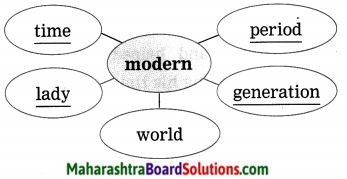
Complete the following word-chain with any four words. Add four words, each beginning with the last letter of the previous word:
Question (a)
Complete the following word-chain with any four words. Add four words, each beginning with the last letter of the previous word:
poverty → ………. → ………. → ………… → ………….
Answer:
poverty → yank → knowing → gorgeous → slap.
Question 2.
Make a meaningful sentence by using the following phrase in your own sentence, “for a while”.
Answer:
Please wait for a while, I will come with you.
Question 3.
Add a prefix or suffix to make new words and use one of the root words in your own sentence:
1. ignore
2. achieve
Answer:
1. ignorance
2. achievement.
Sentence: We should not ignore our duties towards our motherland.
![]()
Question 4.
Complete the following sentences using your own words: (Answers are directly given.)
OR
Add a clause to expand the sentence meaningfully:
(One senteces will be asked in the activity sheet)
Answer:
- He went on to prove that the pug marks found in the mud were not of a dog but of a tiger’s.
- It was Sardar Patel who led the famous Bardoli Satyagraha.
- This is where his decision went against him.
- He did not know much about the customs of the Adivasis.
Personal Response:
Question 1.
Why do you think Faraday’s friend gave him a free ticket to Davy’s programme?
Answer:
I think, the friend knew that Faraday was poor and could not afford to buy a ticket for such a big programme. He also must be knowing about Faraday’s fascination about the subject of electricity, and that would be a great opportunity for him to attend the lecture of the renowned scientist Humphry Davy’s work on the subject chemicals and electrical lighting.
Question 2.
Is it necessary to have social status, money to pursue your goal? Explain why.
Answer:
I think it is not necessary to have social status or money to pursue our goal. Only that, you must have a dream to achieve the goal and continue to work hard towards it. You must keep on trying day and night with perseverance and sincerity.
![]()
Question 3.
Write what is implied in the following sentence: Even then Davy did not have much hope for Faraday. (What do the words ‘even then’ suggest?)
Answer:
Faraday wanted to be a great scientist. But Davy dismissed all his aspirations in the field of science. He made Faraday his secretary then his lab assistant. Faraday worked day and night and learnt about Davy’s experiments. Even after doing such hard work and getting knowledge and experience Davy was not hopeful about Faraday’s scientific career, because of his social status and education.
Question 4.
Write what is implied in the following sentence: People started telling Davy that of all his discoveries, the best was Faraday himself. (What does it suggest about Davy’s work?)
Answer:
Humphry Davy was a renowned chemist who made many discoveries about chemicals and electrical lighting. Faraday wanted Davy to become his mentor but Davy never believed in Faraday’s ability and always tried to keep him away from the experiments he was doing. Davy became jealous of Faraday when he became a celebrity scientist overnight. But Faraday did not receive recognition for his success from Davy. So people started telling Davy that Faraday himself was his best discovery.
Question 5.
Do you agree with Faraday’s following quotation? Explain with his own examples:
‘In order to succeed, your desire for success should be greater than your fear of failure’.
Answer:
Yes. I fully agree with Faraday’s quotation. He wants to say that if you want to get success you should never fear of failures. If your desire for success is greater than your fear of failures, you can definitely achieve your success with determination and perseverance. Davy asked him to reverse engineer Bavarian glass. He toiled hard but failed to do it. He had lost his memory but the disease did not stop him. His failures did not become obstacles in the way of his success.
Question 6.
When you wish to achieve some goal, does it matter what you are?
Answer:
No. When you wish to achieve some goal it does not matter who you are. You may not have status in the society or wealth or even education but still you can achieve your goal with hard work, perseverance, conviction, keen observation and intelligence.
![]()
Activity:
Question (a)
Information about 3 gadgets/instruments
Answer:
1. Telescopes:
A telescope is an optical instrument that aids the observation of remote objects by collecting electromagnetic radiation (such as visible light). The first known practical telescope was invented in Netherlands at the beginning of the 17th century, by using glass lenses. It has use in both terrestrial applications and astronomy. There are many types of telescopes, for example, radio telescope, X-ray telescope, optical telescope, etc. They are generally made up of two lenses placed at a fixed distance to enlarge far away images.
2. Fan:
A fan is a machine used to create flow within a fluid, typically a gas such as air. The fan consists of a rotating arrangements of blades which act on the fluid. The rotating assembly of blades and hub is I known as rotor. A fan concentrates the airflow in the required direction. The punkah fan was used in India about 500 BC. It was a handheld fan made of bamboo strips and other plant fibre. This evolved over the years to the modern fans we see in our rooms daily now.
3. Sewing machine:
It is a machine used to stitch fabric and other material together with a thread. Sewing machines were invented during the Industrial Revolution to decrease the amount of manual sewing work. In a modern sewing machine the fabric easily glides in and out without the inconvenience of needles and thimbles but the earlier sewing machines were partially manual and helped the tailor do the stitching faster saving his time.
![]()
Inventions
Question 1.
Choose any one machine or device and prepare a short note about it. Use the points given in margin of the textbook page no. 88.
Answer:
A Note on Fan
A fan is a machine/device used to create flow within fluid, typically a gas such as air. The fan consists of a rotating arrangement of blades that act on air concentrating the flow of air in one direction. The rotating assembly of blades and motor is known as rotor. Fans are powered by electricity. The ‘punkha’ (fan) was used in India about 500 BC. It was handheld fan made of bamboo. These fans evolved after centuries to the fans, we see today in our homes.
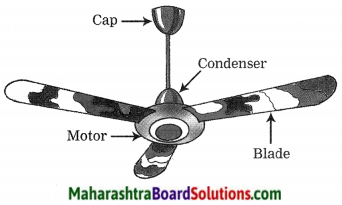
My English Coursebook 9th Class Solutions Unit 3
